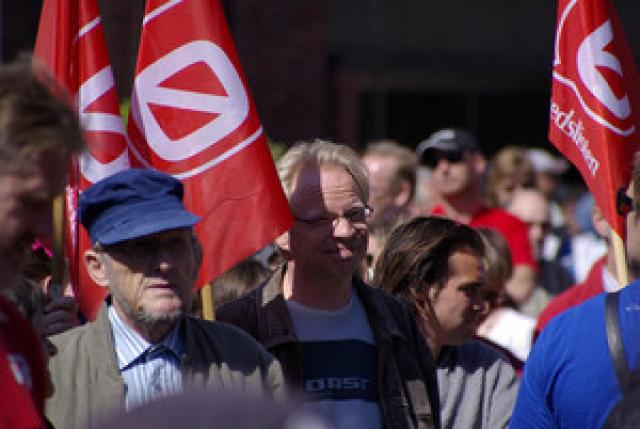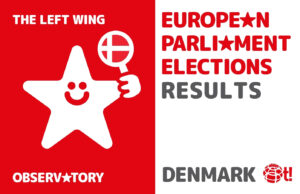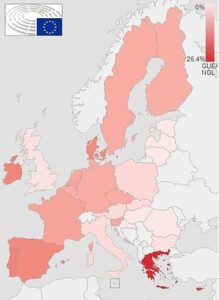Analysis from our member organisation Transform!Danmark on the political landscape in Denmark prior to the European Elections.
For quite some time the fact that Denmark is also approaching parliamentary elections has been dominating the media and the minds of people so that there has been very little discussion on EU-related issues.
At the moment – very late – a feeble EU debate has started to pop up. But as the parliamentary elections have not yet been called, it seems clear now that they will take place either just before the EU election campaign or the two elections will take place at the same time. Both of these scenarios are bad for the EU elections as the main focus in the media and the debate will continue to be on domestic political issues regarding the parliamentary elections.
The present balance of forces
An opinion poll in PolicyWatch in the beginning of the year (data gathered in December 2018), reflects the strength of the political parties in relation to both elections. I. e. there have been opinion polls regarding the EP elections, but the figures reflect more or less the opinions polls regarding the parliamentary elections.
It is vital of course to note that Denmark has only 13 – 14 seats (13 including Britain) in the European Parliament, which means that 1 – 3 seats is usually normal here, where we have quite a high number of political parties (10 – 11) competing at the elections.
One important difference is of course the participation of the People’s Movement Against the EU in the EP elections (since 1979), as well as the fact that the radical left party Enhedslisten/the Red-Green Alliance (RGA) will be standing in the EP elections for the first time. Previously the RGA has supported the list of the People’s Movement. The People’s Movement and the RGA are now in a technical cooperation in the EP elections.
The opinion poll in PolicyWatch in January showed that both the RGA and the People’s Movement would gain one seat in the EP elections. The parties need at least 7% of the votes to gain one seat.
Another quite certain development seems to be that the Danish People’s Party (DPP), the extreme right-wing party, stands to lose votes in both elections. According to the same opinion poll in January 2019 the party stands to lose maybe half of the votes, down to 13. 8 % of the votes, that it gained in 2014, when it was extremely successful with 26. 6 % of the votes.
The Social Democrats wil be gaining from this as well as the big liberal party “Venstre” now in power in a bourgeois coalition government in Denmark.
There are several explanations for the down-turn of the DPP: There are now more parties competing on the right of the political spectrum with regard to which party has the most restrictive policies with regards to refugees and immigrants. Just as in general almost all of the political parties in the Danish parliament have introduced more restrictive policies on this issue. Especially the Social Democrats have attracted many of the voters it had previously lost to the DPP.
A further explanation is of course that the case against the DPP for fraud with the EP foundations MELD and FELD has not yet been resolved, which of course harms the DPP in the EP elections. They have elected a new top candidate for the EP elections.
The political debate
The main issues in the political debate are domestic, as underlined above. But some of them also have a European perspective , for example clearly the climate question, which is a very hot issue, absorbing nearly all the political parties. Here the DPP has shown itself to be very reactionary. At this crucial time they have chosen to leave an agreement on improving the train connections in order to finance more roads and motorways.
There have also been opinion polls regarding voter positions towards EU membership. It is clear that the turmoil around Brexit has made fewer voters oppose EU membership. On the other hand, the voters are still largely opposed to EU integration, and support the Danish opt-outs – ie. Euro membership, military union, etc.
The broad left
Both the RGA and the People’s Movement are EU critical/opposed to the EU. The RGA especially as the EU is founded on neo-liberal principles and imposes neo-liberal policies. Both organizations also focus on the loss of democracy via EU-integration. The RGA is an observer member of GUE/NGL. The People’s Movement has been a member of the GUE/NGL for quite some time.
Besides the RGA there are also other parties belonging to a broader left, besides the the Social Democrats: There is Socialistisk Folkeparti (SF – Socialist People’s Party), who gained one seat in the last EP elections and will very probably do the same in the next elections. They belong to the Green Group in the EP and are strongly pro-EU. There is as well a relatively new party Alternativet (the Alternative) represented in the Danish Parliament and cooperating with DiEM 25 and Varoufakis and his group. They do not seem to be likely to win a seat in the EP according to the PolicyWatch poll.
A recent opinion poll in Altinget (4.4.19) showed the percentages of the parties one the forthcoming parliamentary elections, with the Social Democrats at 27.6 %, “Venstre” at 18%, DPP at 15.1 %, the RGA at 9.3 %, SF at 6 % and Alternativet at 3.7 %.
References
PolicyWatch, 4.1.2019
Altinget, 4.4.2019
Cover photo source: www.greenleft.org.au.



